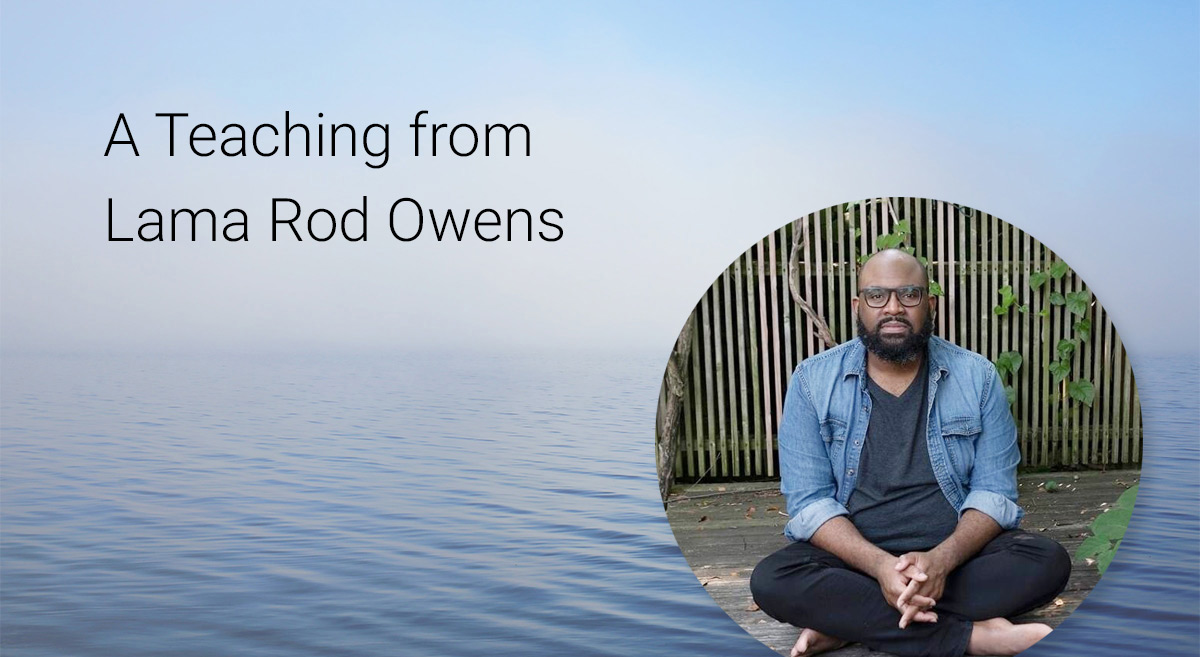by Nalanda Institute with an excerpt from Lama Rod Owens
The new edition of Advances in Contemplative Psychotherapy: Accelerating Personal and Social Transformation offers mental health professionals of all disciplines and orientations the most comprehensive and rigorous introduction to the art of integrating contemplative psychology, ethics and practices, including mindfulness, compassion and embodiment techniques. New chapters within this edition discuss how contemplative work can affect psychosocial change at the personal, interpersonal, and collective levels to address racial, gender and other forms of systemic oppression. As a glimpse into how contemplative work can support these individual and collective transformations, below is an excerpt from one of the chapters from this new edition, written by guest contributor, Lama Rod Owens.
Lama Rod Owens is an author, activist, Buddhist minister, yoga instructor, authorized Lama in the Kagyu School of Tibetan Buddhism, and a guest faculty member within Nalanda Institute’s Contemplative Psychotherapy Program. He is a leading voice in a new generation of Buddhist teachers with over 11 years of experience, whose teachings center on freedom, self-expression, and radical self-care. His teachings are rooted in his own authenticity, which bring together his Master of Divinity degree in Buddhist Studies from Harvard University with his experiences of being Black and queer in America. His offerings focus on the intersection of social change, identity and spiritual practice, inviting students to transform challenging emotions such as grief and anger into their own liberation.
We hope this excerpt invites a reflection on how compassion practice can support both individual freedom as well as our collective liberation from oppressive systems of violence.
Compassion and Spaciousness: Antidotes to Contraction and Violence
by Lama Rod Owens
Compassion is one of the most important practices that we can embrace. It’s also one of the hardest for us to be working on because it’s so easy for us to shut down and contract. It’s so easy to try to protect ourselves out in the world by erecting walls and barriers, and to energetically shut off the empathic part of our bodies — particularly the heart center — or the part of our energetic bodies that deeply sense, deeply experience and feel. And we do this because there’s so much happening in the world, and it is quite overwhelming.
For me and my practice, when I feel overwhelmed, that’s a sign of being super distanced. This kind of overwhelm is similar to when you’re sitting in meditation and you want to do open awareness practice, but you’re focusing on every single thing that’s arising, instead of actually cultivating an openness, an expansion that holds everything that’s arising. If we can hold everything, then we’re not so distracted. That holding is a way for us to practice a profound kind of agency. When I have space, then I get the choice to focus my attention within the spaciousness. And that spaciousness is also where my joy, happiness and contentment arise from. The difficulty is holding the pain, the woundedness, the suffering, the sorrow, the broken-heartedness that exists in the spaciousness.
If there is no space to hold these painful things, we end up contracting around them, and these difficult situations become the totality of what we experience. Contraction is the root of violence. Contraction means rigidity. Contraction means being stuck and being set. Contraction means there’s no movement. When there’s no movement and there’s no space, nothing but tension arises from that. You can directly apply that analysis to systems of violence. When we’re shut down and contracted, when the heart center closes and there is no space, we end up saying things like, “You know what? I’m pissed, I’m tired, I’m sad, I’m overwhelmed.” The issue is I am. When we shut down and have no space, then there is no room for us to differentiate the painful situation itself from our sense of self. I essentially begin to self-identify with my afflictions. There’s no space to do anything else, so I have to become the anger, I have to become the burnout, I have to become the rage. What we’re trying to cultivate instead is this expression of spaciousness so I can do more than just be. I can have experiences in space. I can have the experience of anger; I can have the experience of sorrow and it’s not the totality of my experience.
Editor’s note:
Purchase Advances in Contemplative Psychotherapy: Accelerating Personal and Social Transformation
Learn more about Nalanda Institute’s Contemplative Psychotherapy Program
Pre-order Lama Rod Owen’s latest book today

